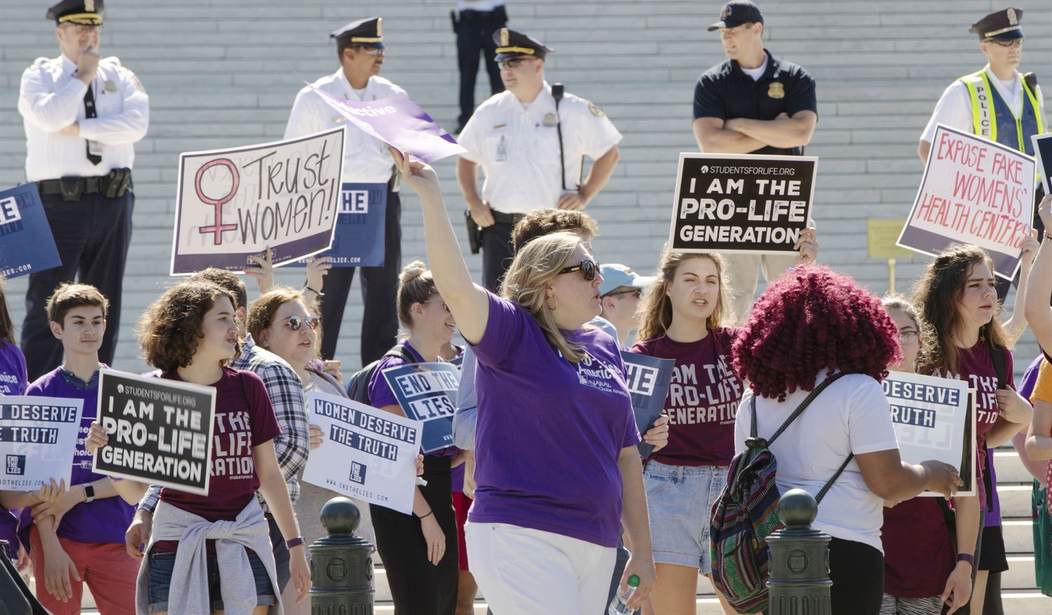"Here's my question," tweets legal scholar Jeffrey A. Sachs, obviously in response to the controversy over Supreme Court nominee Brett Kavanaugh. "What is the alternative reality where Roe was never decided, levels of partisan polarization are identical to our own, and the SCOTUS appointments process is markedly better?"
Here's the problem with the question: If Roe v. Wade had never been decided, if the Supreme Court had just declined to hear cases challenging the constitutionality of abortion bans, levels of partisan polarization would not be anything like what we see around us.
That's my conclusion, and the conclusion of New York Times columnist Ross Douthat. "You'd still have some of the same breakdowns and derangements," he tweeted in response to Sachs, "but America's distinctive kind of ideological sorting-out was not by any means predictable from the vantage point of 1970 or 1975."
It certainly wasn't. At the time, by legalizing abortion everywhere, Roe seemed to be taking the nation where it was already going. In the five years before the decision was handed down in January 1973, 16 states with 41 percent of the nation's population had liberalized their abortion laws. Legislatures in other states might have done so later that year.
Most of the nation seemed headed to the abortion regime that has prevailed in most of Europe, where abortion is generally legal, but not as late in pregnancies as required by Roe and subsequent cases. And in a no-Roe America, just as in no-Roe Europe, different places might have had different abortion laws, changeable through the ordinary political process.
Recommended
The unusually sweeping nature of the opinion in Roe may be due to its having been written by Harry Blackmun, the only one of the 113 Supreme Court justices in history to have devoted most of his prejudicial legal career to being counsel to the Mayo Clinic, defending doctors. Doctors, of course, not pregnant women, were usually the targets of abortion prosecutions.
Far from settling opinion on abortion, Roe made it a national political issue and the focus of national politics. In the 1970s, it cut across party lines: There were plenty of pro-Roe Republicans and anti-Roe Democrats. Conventional politicians dreaded that it would cost them voters from their own party and not gain any from the other.
In my home state of Michigan, for example, former Republican Gov. William Milliken, a wealthy Yale graduate, strongly favored legalized abortion. Former Democratic House Speaker William Ryan, a union supporter who lived next door to a nunnery, was strongly opposed.
Some longtime Republicans were miffed when then-President Ronald Reagan went out of his way in the 1980s to spotlight his opposition to abortion, but his vice president and successor George H.W. Bush followed his lead. Then Democrats blocked anti-abortion then-Gov. Bob Casey of Pennsylvania from speaking at their 1992 national convention.
It soon became clear to aspiring politicians that, outside a few states, there was no future for a pro-life Democrat or a pro-choice Republican. And among voters, views on abortion and party identification had largely converged by 2000. The abortion issue has been the source of most of the controversy in debates over Supreme Court nominees at least since Clarence Thomas in 1991.
What accounts for the lasting influence of this issue? One reason is that Americans are closely divided and, depending on how the issue is framed, ambivalent. Most don't want to ban abortions altogether, but most favor just about every proposed limitation.
Second, opinion hasn't shifted. In the last 15 years, most Americans moved from opposing to favoring same-sex marriage, but opinion on abortion has scarcely budged. Young voters are, if anything, less supportive of abortion rights than their elders.
Third, opinion on this issue is based on moral values of central importance to the way people live their lives. For pro-choicers, the issue is a proxy for personal autonomy. For pro-lifers, it's a question of extinguishing human lives. Things a lot more important to people than whether the minimum wage goes up a dollar or the income tax rate goes down a percent.
So we get, as Douthat puts it, "partisan sorting based on religiosity, which accelerates polarization by theologizing it." Which helps to explain the vehemence of the fight over Judge Kavanaugh's nomination and, in my opinion, the unscrupulousness of its opponents.
What's curious is that on this issue, President Trump's words and actions have been largely dignified and defensible. Which shows that's possible even in a polarized partisan atmosphere.

























Join the conversation as a VIP Member